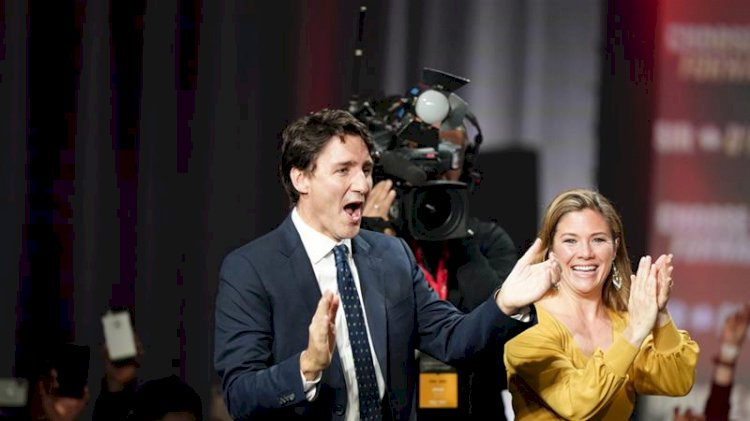Justin Trudeau wins second term in hard-fought Canada election

Without an absolute majority in parliament, Trudeau will need to work with other parties in order to govern.Justin Trudeau was on course to win a second term as Canada's prime minister in an election seen as a referendum on the Liberal leader and his four-year-old government after a series of scandals.
After polls closed, Canadian broadcasters CTV and CBC declared a Liberal minority government, which means Trudeau will have to work with other parties in order to govern.
"You did it, my friends. Congratulations," Trudeau, 47, told supporters in Montreal early on Tuesday. "From coast to coast to coast, tonight Canadians rejected division and negativity. They rejected cuts and austerity, and they voted in favour of a progressive agenda and strong action on climate change."
As of 11:30pm EST on Monday (03:30 GMT Tuesday), the Liberals had won 158 seats, significantly fewer than the 184 seats the party secured in 2015.
In 2015, Trudeau was the "change" candidate, backed by Canadians who were tired of nearly a decade of Conservative rule. But in the last year, he has been dogged by scandals that chipped away at his credibility, including revelations he once wore blackface.
Canada's parliament has 338 seats, and the party that wins the majority of those seats - 170 or more - automatically forms the government and can easily pass legislation. If no party wins a majority, the parties must team up.
It is unclear which party the Liberals would join forces with to govern, with negotiations set to take place over the coming days.
'Singh surge' sputters
Projections showed that either the Bloc Quebecois or the New Democratic Party (NDP) could join the Liberals to form a government. Parties could decide either to pass legislation on a case-by-case basis, or negotiate a longer-term arrangement.
The projected results showed the Conservatives, led by Andrew Scheer, forming Canada's official opposition party. The Conservatives were on track for 122 seats compared with 99 in 2015.
During the campaign, Scheer, 40, said his government would "treat taxpayer dollars wisely", cut income taxes, and balance the budget within five years. He also said he would cancel Trudeau's carbon pricing plan, which he said was costing people too much money, even though there was a rebate.
"Tonight we have put him on notice," Scheer said in Regina, Saskatchewan, of Trudeau. "His leadership is damaged and his government will end soon and when that time comes, we will be ready and we will win. We are the government in waiting."
Before the election, the NDP led by Jagmeet Singh was projected to see a "Singh surge", but on election night the count showed the party in the mid-20s from 44 seats in 2015.Singh thanked his campaign team and his district for re-electing him.
"Friends, throughout this campaign I've heard a lot of stories about Canadians, from Canadians who are struggling, and just want to build a good life but are finding it harder and harder to do so," he told a crowd of supporters.
"And to those Canadians I want to say this to you tonight: New Democrats are going to Ottawa to fight for you."The crowd burst into cheers and applause. Singh is a popular figure among young, left-leaning voters.
As the NDP experienced an uptick in the polls in the final days of the race, Scheer encouraged Canadians to vote Conservative to avoid a Liberal-NDP coalition government, although neither party had made such an arrangement.The Bloc Quebecois had a good night in Quebec - they won 32 seats compared with only 10 in the 2015 election.
The glow fades
The dip in numbers for the Liberals could be attributed to a lack of excitement around Trudeau in 2019.
As the election campaign kicked off, photos emerged of the prime minister wearing blackface on multiple occasions, including once in 2001 at an "Arabian Nights"-themed party at the West Point Grey Academy where he was a teacher. And in early 2019, fearing job losses in an election year, he pressured his attorney general not to prosecute SNC-Lavalin, a company facing fraud and corruption allegations.
Trudeau promised an optimistic future for Canada - including taking climate change seriously, and working nation-to-nation with indigenous people - but many of his supporters felt he had failed to deliver on his lofty goals.
Combined with the scandals, this may have prompted some of his supporters to either switch their support to other parties, or stay home on election day. In 2015, voter turnout reached 68.5 percent - the highest turnout since 1993.Turnout for 2019 was down slightly, to 62 percent.
This election, Canadians could cast their ballot in advance polls between October 11 and 14. The number of voters who did so jumped significantly compared with the last federal election - to 4.7 million in 2019, a 29 percent increase on 2015. There were more advance poll locations this time, and they were open longer.
Last week, former US president Barack Obama tweeted his support of Trudeau, saying he had been "proud" to work with the Canadian leader and he deserved another term.In the end, it was not enough to save the Liberal leader's majority.
